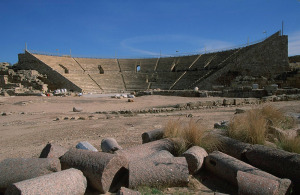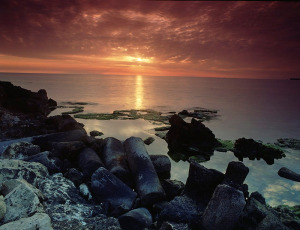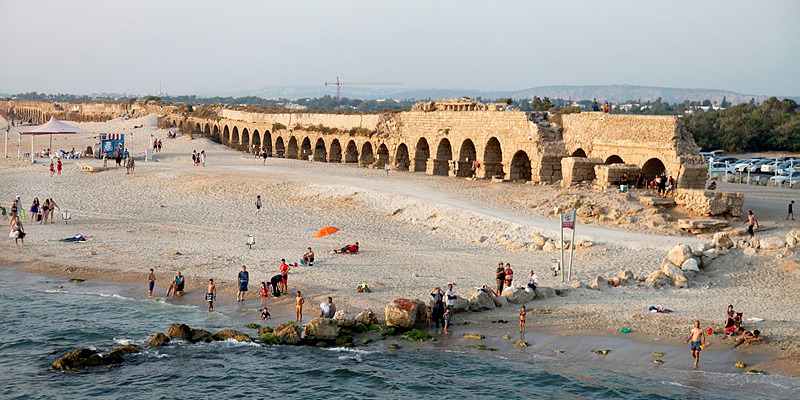
Past meets the present, ancient is blended with the modern, at this former center of power – Cesarea.


View of the old amphitheater in Caesarea. (Photo: Doron Horowitz/Flash90)
This small Israeli coastal town was once the seat of the Roman power in the region, from which they ruled for several centuries.The town was built by Herod the Great at about 25–13 BCE as the port city Caesarea Maritima. At the time, Herod, the Roman ruler of Israel, was engaged in several ambitious architectural projects in Israel, including the mass renovation of the Second Temple in Jerusalem. Caesarea was one of them.
Caesarea served as the administrative center of the Roman province of Judea, which was part of the Roman Empire.
The new city was built to meet the requirements of a provincial capital, and included markets, wide roads, baths, temples to Rome and Augustus, imposing public buildings.
The city further served as a cultural center, and every five years the city hosted major sports competitions, gladiator games, and theatrical productions in its theater overlooking the Mediterranean Sea. The amphitheater and hippodrome are still standing today.
During the Byzantine period, in the 3rd century, the city was chiefly a commercial center. Situated on the historic land bridge between Europe, Asia and Africa, Caesarea served as a relying point for trade coming in-land from the Mediterranean Sea and for export from the Far and Middle East to Europe.
Changing Hands Over the Centuries
Over the coming centuries, the city knew many lords and owners, but it did not return to its early splendor.
Following the Muslim conquest in the 7th century, the city had an Arab majority until the Crusader conquest and renovation of the city. The city was again abandoned after the Mamluk conquest.
Caesarea laid in ruins until the nineteenth century, when the village of Qisarya, the Arabic name for Caesarea, was established in 1884 by Bosniaks, immigrants from Bosnia, who built a small fishing village on the ruins of the Crusader fortress on the coast.
The Ancient Fuses with the Modern

View of archeological findings in Caesarea. (Photo: Doron Horowitz/Flash90)
In 1940, kibbutz Sdot Yam was established next to the Arab village. In February 1948 the village was conquered by a Palmach unit commanded by Yitzhak Rabin, after its inhabitants fled following the unrest in Israel prior to the establishment of the State of Israel.
In 1952, a Jewish town of Caesarea was established near the ruins of the old city, which were made into the national park of Caesarea Maritima.
At this point, the past met the future and the ancient blended with the modern.
The Caesarea ruins serve as a tourist’s attraction, and have again assumed its ancient role of cultural center. The Roman amphitheater, located at the site, often hosts concerts by major Israeli and international artists. Horse races are reenacted in the huge hippodrome in the national park.
Journey Through the Land of Israel
Caesarea has changed many hands over the past 2,300 years, but has ultimately been restored to its original and rightful owners – the Jewish People. Caesarea is one of Israel’s leading tourist attractions. Download our free eBook on the 10 Best Tourist Destinations in Israel.
Author: Aryeh Savir
Staff Writer, United with Israel
Send Passover Packages to Needy Israeli Soldiers - Bring Them Joy!
We are honored to thank the young men and women of the IDF who risk their lives every day to protect the citizens of Israel. Since October 7th, soldiers have been on the battlefield for months - many are hoping to come home for Passover.
Join us in sending Passover food packages (and personal notes) to Israeli soldiers and their families.
Many soldiers spend the Passover holiday with needy families back home. The soldiers greatly appreciate your love and concern. Bring them Passover joy!
CLICK HERE TO SEND YOUR PACKAGE AND NOTE TO ISRAELI SOLDIERS!




